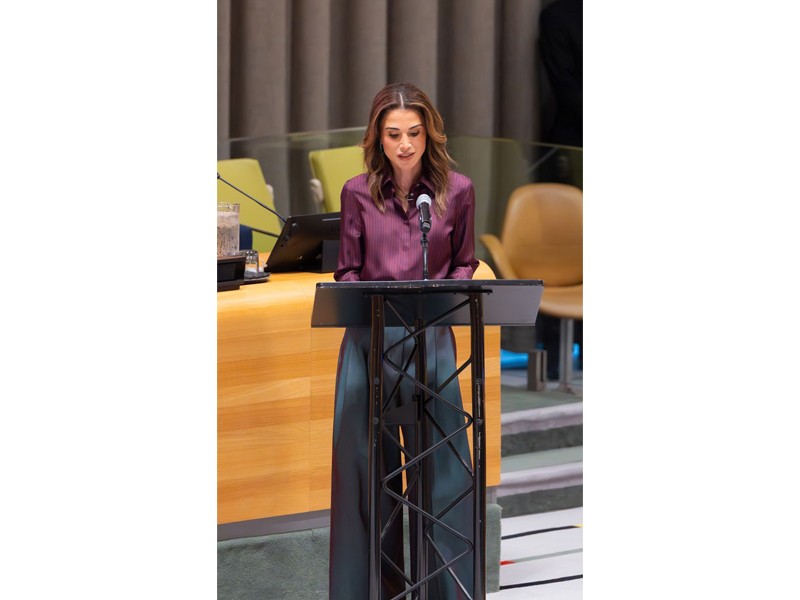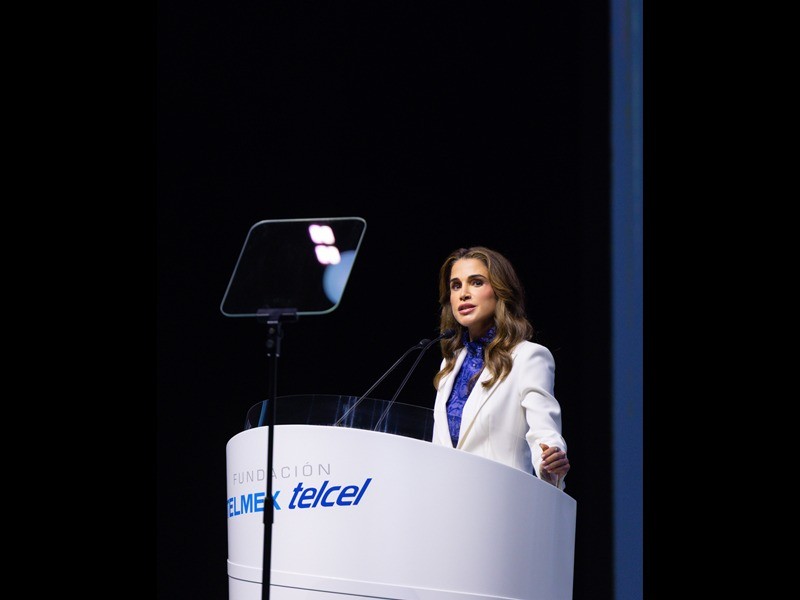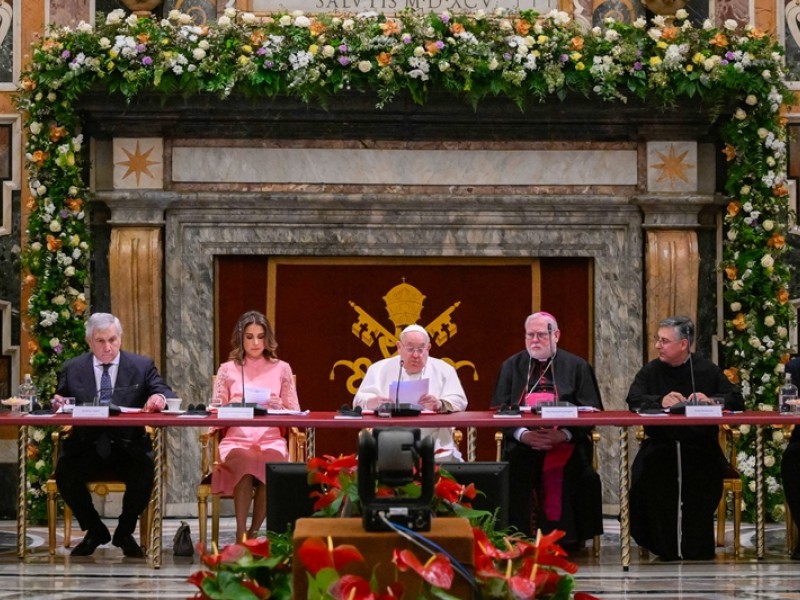Queen Rania’s Speech at 2002 Middle East Institute Women’s Luncheon - Washington DC, USA
I am delighted to be here today, not only to meet women who make things in Washington happen, but also to share some thoughts and learn new ideas from you. Thank you all for joining me for lunch, and thank you Ned for organizing this event. I am grateful for this opportunity to engage with such an impressive group of dynamic and accomplished women.
I have found that my visits, and those of my husband King Abdullah, to the United States have become increasingly focused on the importance of healthy dialogue between our part of the world and yours. This has become especially evident following the painful attacks of September 11. I find it absolutely critical that we balance the large public events of our lives with opportunities to talk, listen and really hear from each other like we’re doing today. These days, the United States and the Western world broadly express unprecedented interest in the condition of women, governance, religion, and political culture in our Arab-Islamic society. At the same time, many in our region also look more closely at recent American policies and the wider Western historical legacy in the Middle East-Asia area.
This dialogue that we find ourselves engaged in is not only healthy, but it is absolutely crucial. It is important because unless we succeed in understanding – in depth and with sophistication – the complexities and nuances of our different, yet similar, worlds, and unless we frame such understanding within an intelligent historical context, I am afraid we will be in danger of widening the gap and of inflicting further injustice on humanity.
I say this because I have found that in our haste to try to attempt to fathom the ills of this world that manifested by the tragic events of September the 11th, we have found it much easier to grab onto a rather simplistic and unfair characterization of the parties to the conflict. I find that many have adopted a very dangerous bi-polar perspective on the world; an often even subliminal segregation of the world made up of “us versus them” – a monolithic West versus a homogenous Islamic society. This sort of perspective is not only divisive, but it also irresponsibly sets aside and ignores the complexities, intricacies, and varieties that make up the human dimension of our world.
Islam cuts across different countries, various continents, widely divergent cultures, languages, and socio-economic classes. Similarly, the West represents a very complex and rich diversity. The importance of dialogue is in helping us understand the various aspects to our respective societies. Only then can we learn to work together for the betterment of humanity.
Much has been said about what makes us different. There are many credible theories out there that allude to that. I suppose that a complex amalgam of these theories is probably closest to the truth. The exact formula of this amalgam is open for debate...a debate that should, indeed, be encouraged and fostered. Yet, as human nature has proven time and again, we always choose to place more of our focus on our differences, and we almost always turn away from our stark commonalities.
So please allow me to open a window on the average life of an Arab citizen, and let’s together take a look at what its like to come from my neck of the woods. Arab parents predominantly worry about improving the quality of life for their families, ensuring access to better healthcare, and securing quality education for their children. Most Arab professionals spend most of their time at work, behind a Dell, Compaq, or IBM computer. Those who are privileged to have an Internet connection worry about the content that their children are exposed to, and how they can balance the indisputable usefulness of the Internet with its potential dangers. The most popular TV show in the Arab World is the Arabic version of “Who Wants to Be a Millionaire?”, a franchise show that has galvanized audiences worldwide. Pop music is indeed popular in the Arab World, with musicians such as Amr Diab, the shining star in this profession, mixing American rap with Arabic lyrics. Arab intellectuals, like their European counterparts, are engaged in a rampant debate about the emergence of this globalized “pop culture” and its potential pitfalls.
Arab mothers fret about whether their children are watching too much TV instead of playing outdoors with their friends. News, movie, and sports channels are popping up everywhere on the Arab airwaves. And Arab wives, like wives the world over, are getting increasingly annoyed as their husbands zone-out and watch football – be it American football or soccer.
Arab governments worry about balancing their budgets, attracting foreign investment, spurring growth, and bridging the digital divide. Arab companies are fine-tuning their strategies, and improving their competitiveness in order to survive in the global market. Arab investors lament their follies during the Internet bubble, just as young entrepreneurs try to sell them the next best thing. And, of course, mobile phones are just as noisy in the Arab World as they are elsewhere.
All these similarities in our everyday lives arise even though most Arab countries are very much part of the developing world. They face the added challenges of poverty, unemployment, war, radicalism, and various inequalities.
Take Jordan, for instance. We are certainly a developing country…but we refuse to believe that there is an obstacle that we can’t surmount. We have chosen not to find excuses to cocoon ourselves. On the contrary, we have exerted every effort to fully comprehend the world landscape we find ourselves in, to communicate our message and to integrate ourselves in the global economy.
And we have accomplished a lot in a very limited time. We have joined the WTO in record time and just a few months ago we concluded a free trade agreement with the United States – making us only the fourth country in the world to grasp such an opportunity. We’re working diligently to increase and diversify our exports. Our regulatory framework is undergoing a major overhaul. Our privatization efforts have already born fruits with multinationals investing in Jordan in a variety of sectors. IT community centers are being rolled out across the Kingdom, and an ambitious e-government program is currently under the way. Our schools are being rapidly computerized, and English is being taught to students at a very early age.
Today, we have built a transparent platform for private- and public-sector dialogue. More importantly, we have formulated a realistic and actionable plan for the future…a plan that is strongly endorsed by the international community, because in its very essence it promotes not only a national, but also an international, partnership.
As a result of all these efforts, during a very difficult 2001, Jordan’s stock market has witnessed a 30% appreciation, our exports have increased 21%, our foreign reserves at an all-time high, our national debt is down, and we are expected to register a healthy 4% growth in GDP.
Yet, much more still needs to be accomplished so that initiatives can have a felt and enduring impact on the life of an average Jordanian. And we need your support. We need more debt relief, more investors, more tourists, and better media coverage. But as a pre-requisite to all of that, we need to get to know each other better…a lot better.
And believe me, no matter what you have heard about Islam, nothing in our religion prevents us from doing so.
In closing, I would like to quote a verse from the Holy Qu’ran:
“O Mankind! We created you from a single pair of a male and a female, and made you into nations and tribes, that ye may know each other.”
Thank you.
موقع جلالة الملكة رانيا العبدالله الرسمي
هذا الموقع الإلكتروني لا يدعم متصفحات الإنترنت القديمة. الرجاء تحديث متصفح الإنترنت إلى نسخة أحدث من إنترنت إكسبلورر 9
متصفح الإنترنت الذي تستخدمه قديم. لتحسين مستوى الأمان عند تصفح مواقع الإنترنت و مشاهدتها بالشكل الصحيح و بفعالية افضل قم بتحديث متصفح الإنترنت الخاص بك



